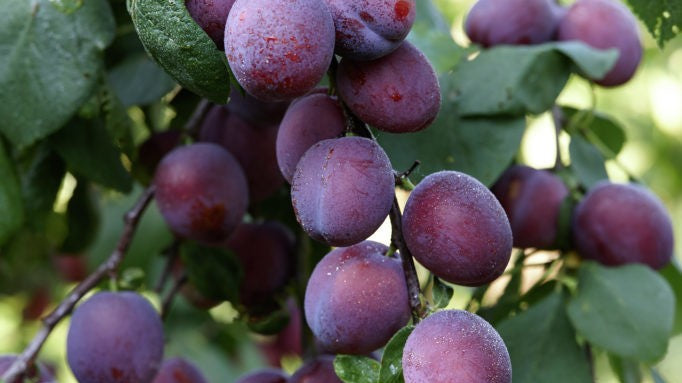كوج عنابي
كوج عنابي
Couldn't load pickup availability
Prunus domestica dwergpruim
Growing Prunus domestica, the dwarf plum tree, involves specific care to ensure a healthy and productive plum tree. Here are guidelines to help you grow and care for your dwarf plum tree:
Materials You’ll Need:
• Prunus domestica (Dwarf Plum) sapling
• Suitable location (sunny and well-draining)
• Well-draining soil
• Mulch
• Balanced fertilizer for fruit trees
• Watering can or hose
• Pruning shears (for maintenance)
Steps for Growing Prunus domestica (Dwarf Plum):
1. Site Selection: Choose a sunny location for your dwarf plum tree, as plums prefer full sun. Ensure the soil is well-draining.
2. Planting: Plant your dwarf plum sapling in a hole that is about the same depth as the root ball but twice as wide. Ensure the root collar (where the roots meet the trunk) is at or slightly above the soil surface.
3. Soil Preparation: Amend the soil with organic matter like compost to improve fertility and drainage. Plum trees generally prefer well-draining soil.
4. Mulching: Apply a layer of organic mulch around the base of the tree to conserve soil moisture, suppress weeds, and regulate temperature. Keep the mulch a few inches away from the trunk.
5. Watering: Keep the soil consistently moist, especially during dry spells. Water deeply, and ensure the root zone receives adequate moisture.
6. Fertilization: Feed your dwarf plum tree with a balanced fertilizer for fruit trees in spring, following package instructions. Adjust the amount based on the age of the tree.
7. Pruning: Prune your dwarf plum tree to shape it, remove dead or diseased branches, and encourage air circulation. Pruning can also help in managing the size of the tree. Follow proper pruning techniques.
8. Pest and Disease Management: Monitor for common pests such as aphids, plum curculio, and diseases like brown rot. Use appropriate pesticides if necessary.
9. Thinning Fruit: As the fruit begins to develop, consider thinning to ensure larger, healthier plums. Remove excess fruit when they are about the size of a marble.
10. Harvesting: Prunus domestica produces plums that are ready for harvest when they reach their full color and size. Harvest the plums carefully to avoid damage.
Always consider the specific care needs of Prunus domestica (Dwarf Plum) and local conditions such as climate and soil type. For more precise information, consult local nurseries, agricultural extension services, or plum tree specialists in your region.
Share



